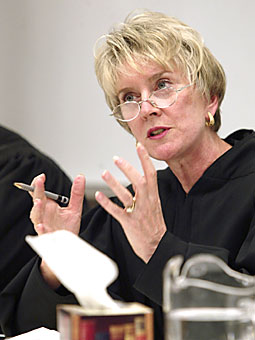 |
|
KEVIN B. KLAUS/Arizona Daily Wildcat
|
Vice Chief Justice Ruth V. McGregor of the Arizona Supreme Court questions lawyers yesterday during a hearing at the college of law. Every year the justices from the Arizona Supreme Court hold a session at the law college for law students to attend.
|
|
|
By Joe Ferguson
Arizona Daily Wildcat
Friday, November 5, 2004
Print this
Approximately 250 students filled a classroom yesterday afternoon at the James E. Rogers College of Law building to hear oral arguments in two Arizona Supreme Court cases.
During the annual visit from the Supreme Court, the crowd of primarily law students watched as the justices heard oral arguments about whether a man who was severely burned during a race at Chandler's Firebird Raceway can have a jury trial.
The heart of the argument before the Supreme Court is whether a "Release and Waiver of Liability, Assumption or Risk, and Indemnity Agreement" signed by plaintiff Charles Phelps before his car crashed into a wall during a race at the raceway should be considered in the terms of Article 18, section 5 of the Arizona Constitution.
Article 18, section 5 states, "The defense of contributory negligence or of an assumption of risk shall, in all cases whatsoever, be a question of fact and shall, at all times, be left to the jury."
Both a lower court and an appellate court ruled Phelps' case should be handled under the terms of contract law, which is decided by a judge.
Phelps' lawyer, David Abney, said the case deserves a jury.
"We do have evidence for a jury to consider," Abney said.
But John Egbert, an attorney representing Firebird Raceway, said the contract Phelps signed with the racetrack and any legal claim should be addressed by a judge, not a jury.
When asked by one of the justices what the harm would be in the case being heard by a jury, Egbert said there would be considerable harm, since a jury is not suited to hearing contract disputes.
"I believe the Court of Appeals got it right," Egbert said. "This is a contract and contract law should apply."
During its two-and-a-half-hour visit, the Supreme Court also heard an appeal filed by the City of Tucson, which is seeking the removal of 122 nonconforming billboards owned by Clear Channel Communications.
The crux of the legal argument is whether a state statute could invalidate a suit filed regarding the billboards.
The city filed the suit July 18, 2000. At the time of the suit, there was no statute of limitations for enforcing the nonconforming billboards. However, a different statute of limitations took effect the day after the suit was filed.
Mike Rankin, Tucson City attorney, said the lower court and the appellate court were wrong when they ruled the new statute could be applied to cases filed before the new statute. Rankin said that if legislature wanted to make the law retroactive, they would have specifically written it that way.
John Munger, an attorney representing Clear Channel, argued the city of Tucson knew about the violations and had exceeded the time limits prescribed in the new statue. He said the city knew about some of the violations for two years before filing suit against Clear Channel.
Students at the hearings said it was an excellent way to see how the state's highest court works.
Todd Adkins, a first-year law student, said he thought it was interesting to watch the Supreme Court hear arguments.
"It was a great opportunity to see the court in action," Adkins said.
Shaun Courtney, a first-year law student, said it is a great gesture by the court to travel across the state every year to allow students and members of the community watch the Supreme Court.
"It shows community spirit," Courtney said. "The access (to Supreme Court justices) was unbelievable."
